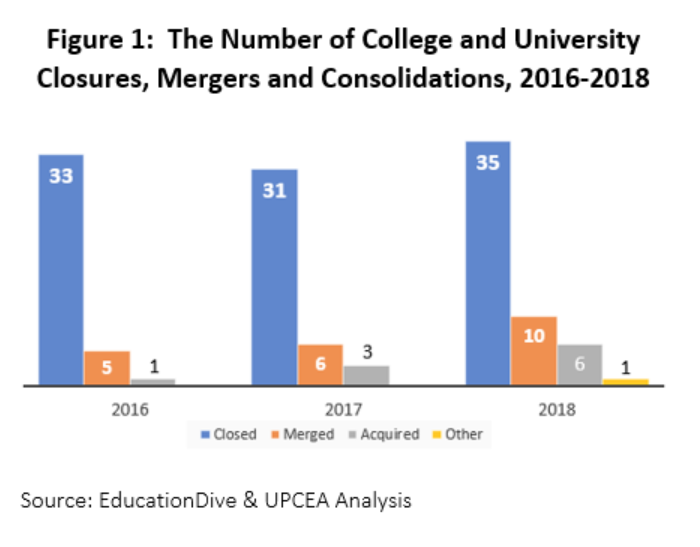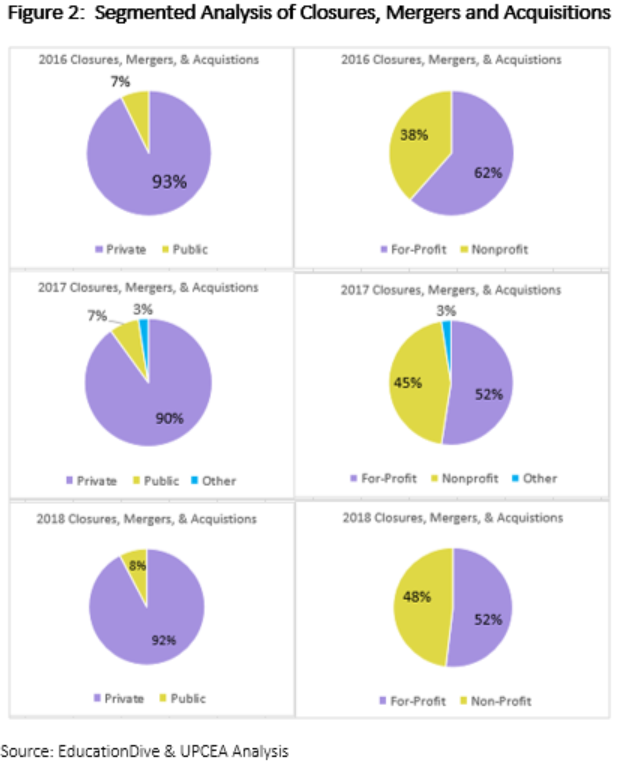The Clock is Ticking…Strategic Recommendations for Higher Education in 2019
The end of 2018 marked a challenging year for institutions of higher education, although the warning signs of declining enrollments and increased competition have been very visible over the past five years or more. For many institutions, there seems to be little sense of urgency to re-think educational products, institutional mission, or alignment to employment despite advances in technology, the aging of America, and the future of blockchain among other economic developments. As de Vinci once said “I have been impressed with the urgency of doing. Knowing is not enough; we must apply. Being willing is not enough; we must do.” At the turn of this century, many institutions innovated by adapting the existing curriculum to a new mode of delivery…online education. They expanded their traditional geographic footprints and charged into that of their competitors. Noting lost opportunities or declining enrollments, other institutions followed suit. Those that have resisted the online movement and not innovated with new degrees or credentials soon found themselves fiscally challenged.
Like many of the United States’ bridges, the infrastructure for higher education is showing significant cracks and fissures. The investing firm Moody’s continues to remain negative on U.S. higher education and forecasts constrained tuition revenue and higher costs due to higher labor[i].

Evidence of a clear trend can be seen over the past seven years or fourteen periods of declining revenues as reported by the National Student Clearinghouse[ii]. NSC most recently reported a decline of 1.7% in Fall 2018, from Fall 2017. EducationDive has been monitoring closures, mergers and consolidation of higher education institutions since 2016[iii]. After removing double counting due to multiple institutions merging into one or one party acquiring another and supplementing the database with additional information, such as the recent announcement that Newbury College would be closing[iv] or the consolidation of multiple University of Wisconsin campuses, UPCEA has concluded that the trend of unhealthy institutional performance is still moving upward and will continue to do so in the near and possibly long-term.

While the sample size year-to-year is small, a further UPCEA analysis revealed that of those closing, merging or consolidating:
- Most are private institutions (over 90%), despite the fact that nationally, just under half of all higher education institutions are private.
- While the universe of higher education has more non-profits, the proportion of for-profit institutions merging or folding is disproportionately higher, as can be witnessed with activity from ITT, Capella and others.
- Many struggling or recently closed institutions are also located in the Northeast and Midwest regions of the U.S.
Colleges and universities only have a few paths to buck the trend: increase revenues, decrease costs, or both.
What can colleges and universities do better in 2019? Consider the list below a checklist for senior leaders.
- As a cost and revenue strategy, institutions can re-assess existing portfolios for curricular areas of strength to continue to build, extend, or re-package, while retiring or re-engineering legacy programs. While many liberal arts programs and degrees are struggling, the possibility of better aligning them with greater employment possibilities should be explored.
- As a way to attract new markets and revenues, deconstruct or bundle educational offerings to better meet the needs of employers and students. In a new economy with new participants (Generation Z and young Millennials, as well as Millennial managers and Generation X leaders), there are many educational choices. Being wed to a degree-only mentality is dangerous and diversification through curriculum, delivery, and credentialing is likely to stave off closure.
- As a means for greater internal efficiencies and a focus on enrollments, develop a “true” strategic plan. A “true” plan—in the sense of actionable and intentional planning and execution among many parts of the institution—is needed, as opposed to the creation of a politically safe document that sits on the webpage or shelf with easily achievable goals. The plan should also have real-time and longitudinal metrics to encourage accountability while measuring progress.
- As both a cost and revenue strategy, strengthening advisory committees (not ones for show or politics) is essential in a new and chaotic economy. While having donors and highly visible individuals on boards and committees has been the norm for many institutions, the value of information and guidance from truly engaged representatives of the employment community will help identify curricular and enrollment winners and losers faster.
- Identify new markets and streams of revenue through market evaluation of new program ideas. Launching a new program or degree without due diligence and relying solely on the content expert is an unnecessary risk. While the intent of a new program is usually to create new revenues, a bad program can greatly impact the cost side of the equation, as well as divert resources away from positive revenue programming.
- As a measure to improve efficiency and return on investment, the institution should critically review conversion and intake processes. UPCEA research has shown that many institutions invest heavily in “top-of-the-funnel” activities with marketing and advertising, yet fail to convert as a result of antiquated enrollment management processes aimed at the wrong generation.
- Nurture existing markets more effectively, such as alumni. Many institutions have a low return transactional approach to alumni—they hope for a gift from a small percentage of “past customers” to their capital campaigns instead of broadening the portfolio of offerings to them. The advancement department becomes the gatekeeper of alumni interests, when in reality, they should be developing more meaningful relationships across the institution. The new generation of alumni expects a return on investment, as opposed to previous generations where a gift was given with little expected in return. Millennials and Generation Z alumni are more likely to re-engage with the institution for life, but are driven by causes or receiving value back. They are prime candidates for graduate education, as well as certificate or badge-based education, as they are the true lifelong learner.
Time is running out for the highest levels of leadership at many colleges and universities to make meaningful change. Those that cannot accelerate decision-making processes, don’t work in a positive or future-facing manner with faculty or unions, or those that are wedded solely to campus-based degree learning are likely to die a slow death, following many that suffered this early fate in 2016 to 2018.
[i] Moody’s Investor Service, “U.S. higher education outlook remains negative on low tuition revenue growth,” www.moodys.com, December 05, 2018
[ii] National Student Clearinghouse Research Center, “Current Term Enrollment – Fall 2018,” www.nscresearchcenter.org/tag/enrollment-trends/, December 13, 2018
[iii] https://www.educationdive.com/news/how-many-colleges-and-universities-have-closed-since-2016/539379/
[iv] https://www.bostonglobe.com/metro/2018/12/14/newbury-college-shut-down-spring/s2w8WjwpFXAqUsyNUsjixM/story.html
Learn more about UPCEA's expert consultants.
Do you need help with your PCO unit or campus? We can help. Contact UPCEA Research and Consulting for a brief consult. Email [email protected] or call us at 202-659-3130.
Trusted by the nation's top colleges and universities, UPCEA Research and Consulting provides the best value in the industry today. UPCEA's industry experts have years of experience in Online and Professional Continuing education - put them to work for you!
UPCEA Research and Consulting offers a variety of custom research and consulting options through an outcomes-focused pricing model. Find the option(s) that best suit your institution.
Learn more about UPCEA Research & Consulting
The UPCEA Difference
Unmatched Experience: For more than 100 years, UPCEA consultants have exclusively served the needs of online and professional continuing education programs. UPCEA consultants leverage their extensive industry expertise to expedite solutions, anticipate upcoming shifts, and offer distinct best practices, effectively aiding clients in achieving their goals.
Cost Effectiveness: As a nonprofit, member-serving organization, we provide unmatched value, allowing you to maximize limited research and consulting budgets.
Action in Motion: Our cadre of experienced, skilled authorities and expert practitioners propels you forward, translating research and consulting into impactful implementation, a distinctive hallmark of UPCEA. Our team of current and former institutional leaders will support you, turning research and consulting into action.
Mission Alignment: Like you, our mission is to enhance and expand educational opportunities and outcomes for adult and other non-traditional learners. We share your values and work in partnership with you to advance access and excellence in education.
